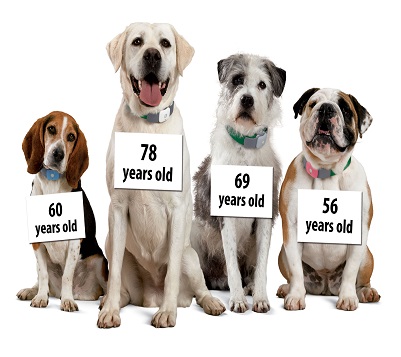When you’ve had your pet for years, it can be heartbreaking to watch as they age. Pets undergo many of the life changes that people do, and they can be just as challenging. Here are some of the challenges of caring for a senior pet, and some suggestions to make it easier.
What is Considered Old for a Pet?
According to the American Veterinary Medicine Association, dogs and cats age faster than humans, but not necessarily in that famous 7:1 ratio.
A cat between 15 and 20 “real” years is aged as much as a 75-98 year old person. Larger breed dogs age faster than smaller breeds. A small or medium breed dog who is 10 “real” years is about 56 or 60 in human years, while a large breed dog the same age is between 66-78 in people years. By 15 or 20 years old, small and medium dogs may be between 76 and 105 years old. Large breed canines of the same age are between 93 and 120 years old in human years.
Failing Eyesight
Pets can develop cataracts just as humans can. They also can experience general failing eyesight due to old age. If you notice that your pet is bumping into things or standing at the wrong door to be let out, they may have failing eyesight.
There’s not much to be done in this case. But you can assist by making sure there are no hidden dangers on the floor that your pet could get into by not being able to see well.
Irregularity
Pets such as dogs and cats of all ages sometimes have accidents, but senior pets have this problem more often. If this is happening in your household, consider laying down absorbent pet pads where the accidents most often occur. Most good pets don’t want to soil the home, and they might actually make an effort to go in the bathroom or on a tiled floor surface. There may definitely be a pattern, and you may be able to avoid stains by using those pads. If you work long hours contact Barking Life Pet Concierge for a midday potty break visit to tend to your senior pet while you are work.
Weakened Immune System
Senior pets who are suffering from or recovering from a larger health issue such as cancer, liver disease or heart disease, may have a weakened immune system. This will make them more prone to some other illnesses, such as colds. Be sensitive about exposing your pet to extreme climate conditions. Keep the home at a comfortable temperature even when you aren’t home; your pet’s body may have a harder time regulating internal temperatures in the senior years.
Finicky or Low Appetite
Pets may develop a more finicky or low appetite as they age. This could be due to sore or missing teeth, inactive taste buds, or an underlying health disorder. Try to be as patient as possible with your senior pet about their eating habits. It’s very important that he continues to eat so he receives adequate nourishment.
Try to experiment with different foods. If you haven’t already, measure the food quantities you give your senior pet, and take note of how much is left uneaten. That way you’ll be able to give your vet an accurate accounting of how much – or how little – your pet is eating on a daily basis. With your vet’s approval, be generous with tasty additions like gravies. These may help whet your pet’s appetite.
Loss of Mobility
Pets can experience a loss of mobility in old age for many different reasons. They may have developed arthritis, have a circulatory problem, or there may be an underlying disease. Common indicators include limping, or favoring one leg, an inability to stand for long periods of time, a reluctance to run or jump, and a general slowness of movement or sluggishness. These are all signs that it’s painful or difficult for your senior pet to move.
You can help ease things for you senior pet by making it easier for him to get around.
- Move the water and food station nearer to your pet’s sleeping area so he doesn’t have to walk so far. This may help ensure he gets enough daily calories.
- If your pet has always enjoyed swimming in the past, consider helping him into the shallow end of the water and spending time in there with him. The buoyancy may temporarily relieve aching muscles and joints.
- Consider placing a set of pet stairs next to your bed if you’ve always let your pet sleep up there. A senior pet may no longer be able to make that leap.
- Your senior dog won’t be able to keep up with a long dog walk with other dogs in your home, and it will be a constant uncomfortable tugging on his collar instead of a treat. Instead, apprise the dog walker of your pet’s special needs and ensure that your dog is walked solo.
As your pet ages, it’s more important than ever to bring them to the vet on a regular basis. Certain conditions associated with senior pets can be reversed or mitigated with modern veterinary medicine. Other symptoms might be lessened, making the transition into old age easier on your beloved pet.

